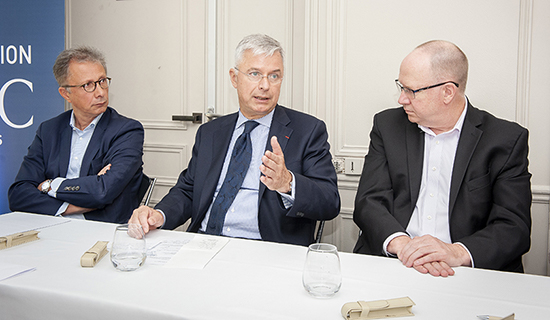Three Questions for Hubert Joly
In a rousing introduction to Hubert Joly at the Matins HEC, H&C editor-in-chief Arthur Haimovici described Best Buy’s CEO as being responsible for developing “a new model for the retail industry in the Amazon era.” Joly’s ability to transform the ailing electronics retailer chain into one of the US’s most successful companies confirmed Joly’s reputation as “the man for difficult situations” .

To achieve this, the 59-year-old used qualities of managerial skills anchored in what he calls purposeful leadership. After the three-hour exchange with fellow-HEC Alumni, journalists and academics, he describes for us the influence of his Alma Mater, the challenges for tomorrow’s leaders and the response from fellow-CEOs to his purposeful leadership philosophy.
You said you have a considerable debt to HEC Paris where you were a student between 1978 and 1981. Could you elaborate?
Hubert Joly: HEC has been a great springboard for my career. One of the big challenges in life is to get that very first job. As Bertrand Jacquillat reminded us, he and Christian Vulliez, provided me with the opening to work as Jacques Mayoux’s assistant, when Mr. Mayoux was the chairman and CEO of Sacilor. This then led me to be recruited by McKinsey where I spent 13 years developing my managerial and leadership skills thanks to my colleagues and clients. So, HEC has been a great platform from where my career lifted off. Not to mention the fact that I made lifelong friends there.
Rodolphe Durand, the newly-appointed holder of the Joly Family Endowed Chair in Purposeful Leadership, said earlier that one of the great challenges ahead will be to change the mindset of students coming into HEC, to underline that the bottom line is not the only criteria in business. You said that you have been developing your thoughts about purposeful leadership for more than 25 years. Tell us more.
I believe that the search for meaning is an essential quest for each individual. I further believe that a company is a human organization where individuals collaborate on a project, and that linking the search for meaning of a company’s team members with the purpose of the company is a key priority for a company and the individuals who work there. I believe that a company’s purpose must contribute to society’s common good. Finally, I believe that it is hard to be a strong, authentic leader if you do not bring your whole self to work and artificially separate your business life and your personal or spiritual life.
You brought up earlier the letter sent out by Larry Fink, CEO of Black Rock, the world’s biggest investment firm in which he exhorted his fellow leaders to integrate a sense of purpose into their company strategy. Do you feel that these purposeful leadership principles are gaining ground?
I am certainly not the only one who believes in these principles. A good illustration of this is my friend Bill George who led a remarkable success story when he was the CEO of Medtronic and is now a professor at Harvard and the author of a terrific book about purposeful leadership, Discover Your True North . What is true is that while business schools tend to do a great job teaching management techniques, like the 4 Ps of marketing or how to calculate an NPV (Net Present Value ), I believe it is essential that they put more emphasis on leadership. The idea of creating this Chair is to help HEC become a leader in this field, by investing in research and in the dissemination of the principles and practices of Purposeful Leadership.
For further reading please go to the article “Landmark Agreement between HEC Paris and Hubert Joly to Create Purposeful Leadership Chair”